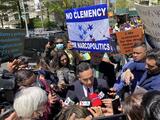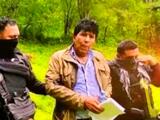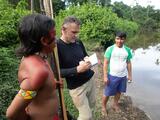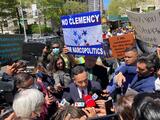New York prosecutor says accused drug trafficker "thrived" with the help of Honduran president
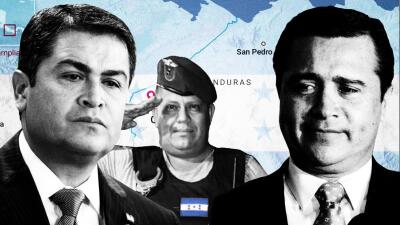
NEW YORK - Honduran businessman, Geovany Fuentes Ramirez, distributed massive quantities of cocaine to the United States in collaboration with the current president of Honduras, Juan Orlando Hernández, a prosecutor told a jury in New York federal court on Tuesday.
"He (Fuentes) was a key part of the Honduran narco state ... a powerful, untouchable drug trafficker who made millions helping the president traffic cocaine," said prosecutor Jacob Gutwillig in his opening statement to the jury. “Tons of cocaine, guns, violence, brutal murders, bribes and corruption. This case is about a violent drug trafficker ... he bribed and killed to pump cocaine into this country,” he added.
Fuentes, who is charged with drug trafficking and weapons offenses, ran a secret cocaine laboratory hidden in the mountains of Honduras “where he produced enormous amounts of cocaine,” the prosecutor alleged. “He bought those he could, and he killed those he could not,” he added.
“His cocaine business thrived because of his connection to police and politicians … the defendant bribed them all, bought and paid for,” he went on, listing mayors, members of Congress, military generals - including Hernandez.
Testimony of ex-narcos
In his opening statement, defense lawyer Eylan Schulman warned the jury not to trust the words of self-confessed drug traffickers who would be brought to testify against his client, who he described as "an innocent man, wrongly accused of very serious crimes." He described Fuentes as a good father of four children who ran a wood business.
If the members of the jury use their "common sense", he said "you will see that the government's case is dependent on self-interested witnesses with too much to gain, too little to lose."
The government's witnesses were "desperate" to avoid long jail term themselves and had admitted to smuggling tons of drugs and dozens of murders. The use of witnesses of that caliber "will leave you shaking your head about how our government could rely on their testimony," said Schulman.
Prosecutors are expected to call several former drug traffickers to testify. Devis Rivera Maradiaga, co-leader of the violent Cachiros crime family who has been a star witness in a number of notable trials, could be joined by his brother, Javier, on the stand for the first time. While prosecutors admit they are notorious criminals, they say their testimony will be corroborated by other evidence.
The government could also count on the testimony of two protected witnesses, including one who just made contact with prosecutors about a week ago after apparently traveling from Honduras to New York.
The trial is expected to last a little over a week. A guilty verdict would condemn 51-year-old Fuentes to a minimum of 40 years in prison and ratify the accusations against Hernández in the case, further complicating relations with the U.S.
Promises
At secret meetings with the president in 2013 and 2014, the prosecutor said Fuentes and Hernández "plotted to send as much cocaine as possible to the United States." Gutwillig went on to allege that Fuentes paid Hernandez $25,000 while the president promised to provide police and military protection for the laboratory and "shield him from prosecution."
Hernández allegedly told Fuentes at one alleged meeting, “ we’re going to shove the drugs right up the gringo’s noses,” according to evidence in the trial.
Fuentes also alegedly gave the president "access" to his drug laboratory. Fuentes was also given a green sub-machine gun by a powerful Honduran general, which Gutwillig described as "the perfect symbol of the violence and corruption that fueled the defendant's drug business."
Fuentes allegedly reported “directly to Tony Hernández,” a brother of the president and former legislator who was convicted of drug trafficking in October 2019. After a lengthy delay due to the pandemic, he is scheduled to be sentenced later this month. During that trial, President Hernández was accused of accepting more than $1 million from Mexican drug trafficker Joaquín 'El Chapo' Guzmán.
Photos and guns
Fuentes was arrested in March 2020 by DEA agents at Miami International Airport. The government's first witness on Tuesday was DEA agent, Brian Fairbanks, who described how, after Fuentes was arrested pictures of guns of all kinds and wads of cash were found on his cell phones and his son's iCloud account. They also found among Fuentes' phone contacts the number and email of President Hernández. The number was corroborated by an application for a U.S. visa by Hernandez in 2011.
Among numerous photos they found images of Cristian Fuentes, Geovanny Fuentes' brother, with President Hernández. One photo shown the jury, was of Cristian Fuentes attending Hernández's birthday party in 2017. Another photo showed Hernandez with Fuentes' children, some years ago. In his opening statement, Fuentes' lawyer conceded that Fuentes and Hernández knew eachother, and were introduced by a prominent Honduran businessman, Fuad Jarufe.
But defense lawyer Schulman pointed out that there were no photos of Geovanny Fuentes with guns or cash, or drugs for that matter. "Don't be fooled by the images," he told the jury, "in the social media world that we live in today, you will all know that the images could have come from anywhere."
The embattled president has denied all accusations of links to drug traffickers, affirming in a recent address to Congress that drug traffickers have found a “magic key” to reduce their sentences by telling what he says are lies against him. The address was in response to a bill presented by U.S. senators that would sanction Hernández due to alleged corruption and drug trafficking.
Hernández warned that bilateral cooperation, including extradition and counternarcotic operations, could "collapse" if U.S. officials "commit the error of awarding the narcos who give false testimony instead of raising their sentences.”

